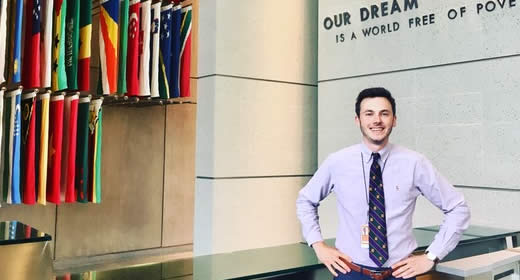
Timothy Trollope (MPP '18) is submitting this field report from his summer 2017 internship at the World Bank, where he worked in the Climate Change Group.
How climate change, disaster risk, poverty, and resilience connect to each other felt opaque to me before I started my internship with the World Bank Climate Change Group this summer. And how do these terms relate to the World Bank’s twin goals of eradicating extreme poverty and bolstering shared prosperity among the bottom 40 percent of the population in each country? Learning about and understanding the relationship among those topics has been a truly enriching experience--one that was facilitated by applying skills I learned in the classroom.
- Review more internship field reports from Ford School students who have served organizations around the world.
The concept of diminishing marginal utility of wealth, taught in Justin Wolfers' and Dean Yang’s economics classes, was one of the first concepts I encountered at the workplace. One of the basic premises of the Bank’s work today is that natural disasters – aggravated by climate change - are devastating to all affected; however, not everyone experiences them the same way. A dollar in losses does not mean to a rich person what it does to a poor person, who may live at subsistence level or lack the means to rebound and rebuild after disaster strikes. Be it a drought or flood, the poor are always hit harder than their wealthier counterparts. Moving away from thinking about the losses of people wealthy enough to have wealth to lose (assets and production) was one of the most striking thought experiments during my internship.
Once the difficult task of quantifying those impacts on the poor has been managed, the question of how to reduce their vulnerability becomes pertinent. Here things get really interesting for an institution that most people perceive as a large infrastructure and project finance bank. Indeed, investments in infrastructure that withstand natural hazards matter, but it is equally important to acknowledge that not all disasters can be avoided and that we also need to build the ability of communities to cope with disasters, and to recover rapidly from shocks. Thus, expanding financial inclusion, disaster risk and health insurance, social protection and adaptive safety nets, are “resilience” policies the Bank seeks to promote. This could include personal banking or insurance policies and social protection systems such as cash transfers and public works programs. These particularly make sense in Sub-Saharan Africa where most people are not covered by any social safety net and the consequences of natural disasters are shared unequally across the population.
Measures that not only make good sense but also good economics can help countries and communities save approximately $100 billion a year and reduce the human cost of disasters by 20 percent. Learning about how the World Bank Climate Change Group seeks to mainstream those resilience analytics and policies into every day Bank business is an exciting opportunity that has ultimately inspired me to seek a career in international development.
Timothy Trollope (MPP '18) graduated from the Dresden University of Technology, Germany with a degree in international relations and a minor in economics. He is passionate about the economics of energy transitions worldwide and has previously interned with the German Ministry for Economic Affairs and Energy, the Federation of German Industries, and the Australian Department of Foreign Affairs and Trade. During his time in Dresden he was actively involved with a local NGO as a German and math teacher, helping Syrian refugees adjust to a new life in Germany. Trollope holds merit-based scholarships from the German Academic Exchange Service and the Friedrich Naumann Foundation for Freedom. His World Bank internship was made possible through support from the Ford School's Annenberg Fund for International Policy Education.
